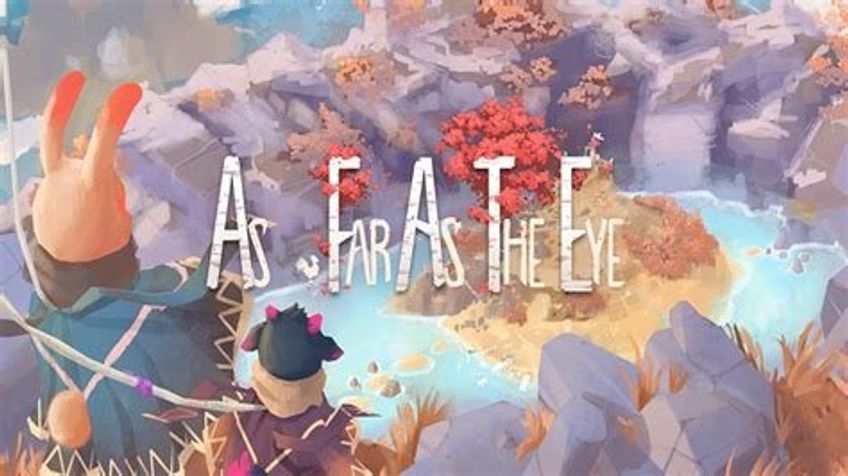As Far As The Eye
As Far As The Eye occupies an interesting space in my mental map of games. It is one of the few games that has earned a permanent place on my harddrive, yet I don’t play it all that often. As of this writing, I’ve put 23 hours into the game, but I think that’s more a statement of how much free time I have and how much time I spend gaming than it is a statement about this particular game.
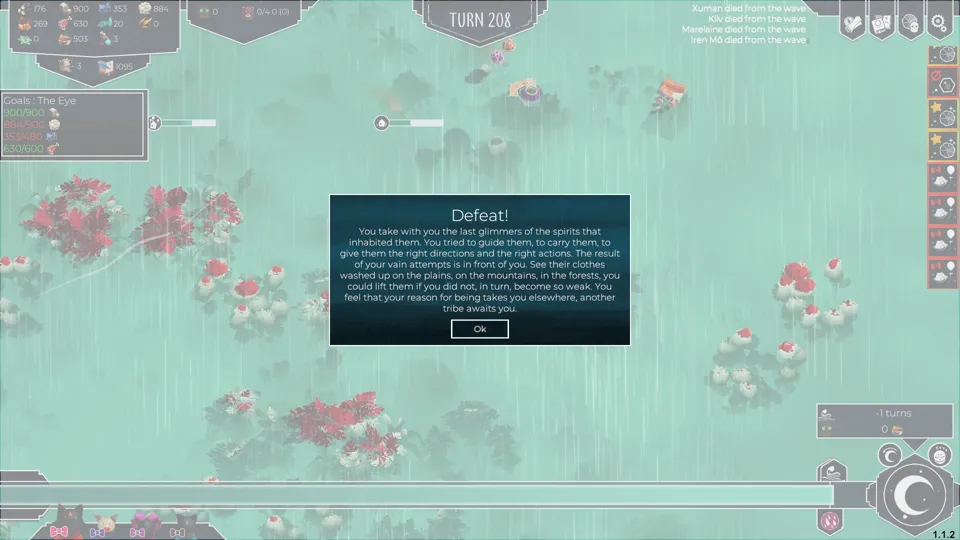 Just this once, Rose, everybody dies!
Just this once, Rose, everybody dies!
As Far As The Eye is a combination survival and strategy game. You “guide” a group of wanderers as they head to the Eye, a faroff destination safe from the world’s rising sea levels. These rising sea levels provide a timer for the game, giving the wanderers a limited amount of time in which to gather resources and advance along their path. As they gather these resources, however, they become more skillful, gaining boosts to their harvesting speed, the amount of resources they gather, and what they are actually capable of. Each stop of the caravan provides new opportunities to learn, grow, or die.
It isn’t a survival game in the same vein as Alone or even Ashwalkers . While the stakes are clear from the outset, it isn’t a single person’s survival on the brink that matters. If anything, As Far As The Eye reminds me the most of Rimworld.
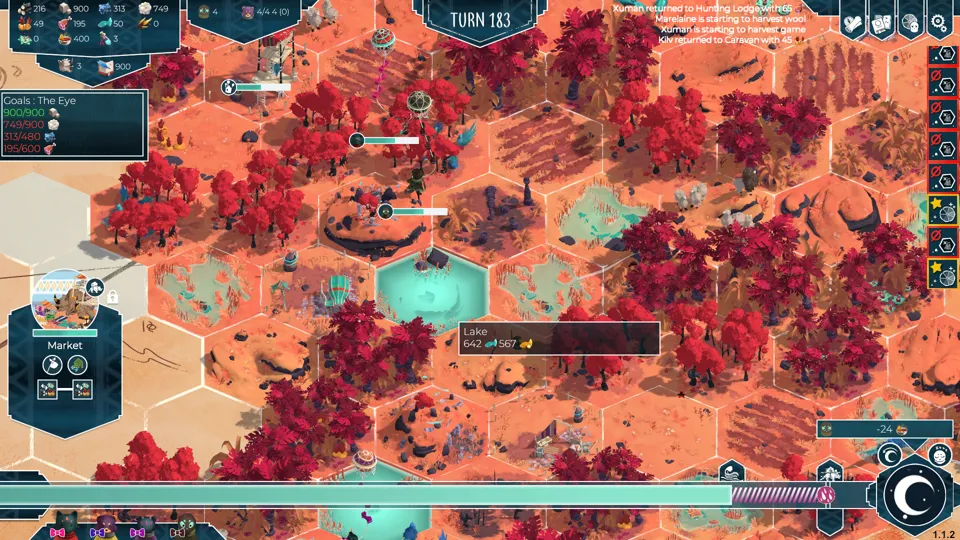 Pictured: A game definitely reminiscent of everyone’s favourite warcrimes simulator
Pictured: A game definitely reminiscent of everyone’s favourite warcrimes simulator
It’s an odd comparison. Rimworld, notoriously, is a base-builder, where the player manages a group of colonists as they fight off raiders, built a more and more ornate base, then leave the planet they’ve been stranded on by one means or another. As Far As The Eye, on the other hand, has no combat, no bases, and no true escape. The various members of the group have only the trail ahead of them, an occasional friendly caravan, and the sole barrier of what they need to continue their journey.
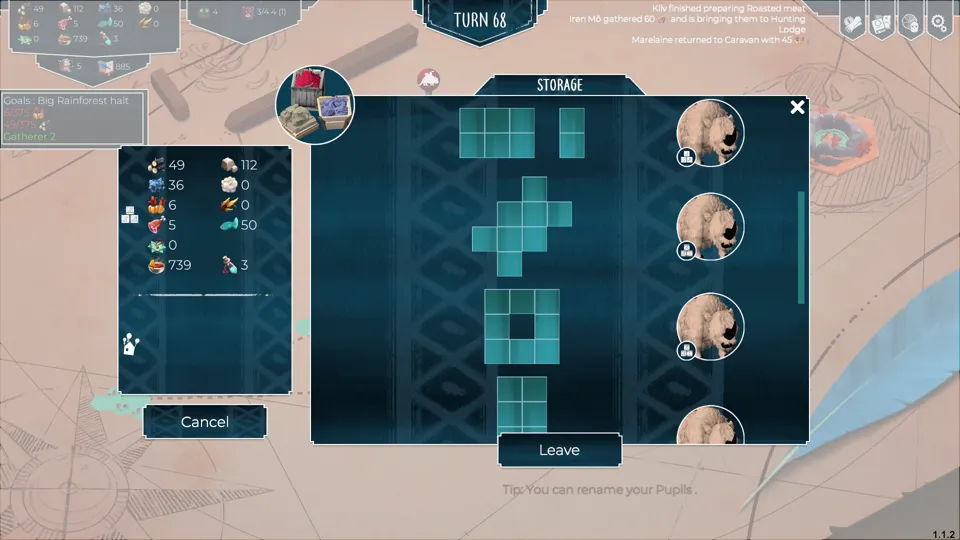 Oh, and the true enemy: Limited storage space
Oh, and the true enemy: Limited storage space
However, the fundamental challenge is the same - how do you help a group survive? How do you make the most of ever-diminishing resources? When decisions about survival have to be made, how do you choose what or who to sacrifice, and how much? The entire game is a deeply satisfying puzzle of management, decision-making, and survival, all in a beautiful package with soothing music playing as your tribe gets slaughtered by yet another catastrophe.
Oh, yes. There’s death in this game. Death abounds.
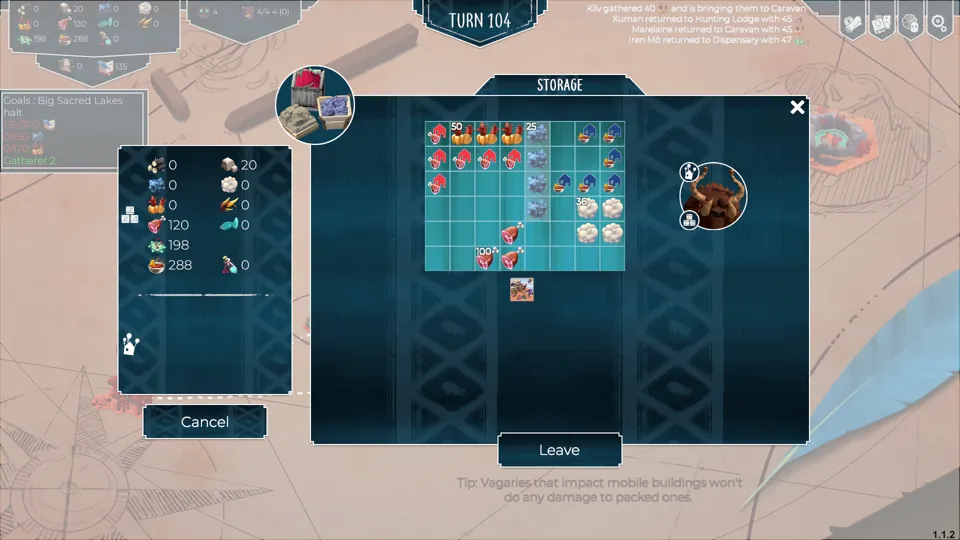 I included a second picture of the inventory screen because, if I’m honest, this is one of my favourite parts, and I need you to know that.
I included a second picture of the inventory screen because, if I’m honest, this is one of my favourite parts, and I need you to know that.
This is one of the aspects that fascinates me the most about As Far As The Eye. For all its soft, plush exterior and easily accessible gameplay, its actual mechanics are brutal and harsh. The game’s overall map and caravan stops are all procedurally generated, and the player is very much at the mercy of the random number generator. What might start as a smooth, easy run can rapidly escalate into an unwinnable hellscape. The initial people you draw may be so fundamentally flawed that they are impossible to win with.
And yet, you are meant to find a way. You’re meant to get any group, no matter how flawed or how disadvantaged, to safety.
I very rarely win my playthroughs. I try to plan ahead as best I can and invest my limited time into building up what I think will be the most advantageous people. I try to stockpile resources and maintain balance with the world around me so the cataclysms, when they inevitably strike, are less hellish than they might otherwise be. In the end, though, it’s just not enough. In my most recent playthrough, I reached the penultimate stop flush with resources, and found myself slowly burning them as I realised the world around me had none of the resources I actually needed to continue. I watched the waters rise with the knowledge there was nothing I could do.
The brutal difficulty of the game is why I don’t play it often. I don’t like losing, but I specifically don’t like losing when I’ve gotten invested in my little characters and want to see them make it. As Far As The Eye gets me invested in the characters, gets me invested in their growth, then rips them away, time and time again. It’s that brutal difficulty that keeps me coming back as well, though. Every time I load up the game, I know it will end in heartache, but still, I believe that this might be the one group that makes it. Just this once, everybody lives. Of course, whether they make it or not isn’t truly in my control, but then, nothing in life is. We exist in a space not our own, and so too do these little people. Some make it. Some don’t. Everyone has to try.
That’s why it occupies that coveted space on my harddrive. The heartache when I die feels frantic and earned. The victories even more so. For a procedurally generated game with nothing but atmosphere and a loose setting, the stories I craft within it are compelling enough to keep me coming back, even when I know I’ll lose. The losses don’t feel like losses anymore. They feel like the ends of the stories that are still worth telling. It’s sweet, and it keeps me guiding these groups into oblivion time and time again.
Developer: Unexpected
Genre: Strategy, Colony Sim
Year: 2020
Country: France
Language: English
Play Time: ~2 Hours Per Playthrough
